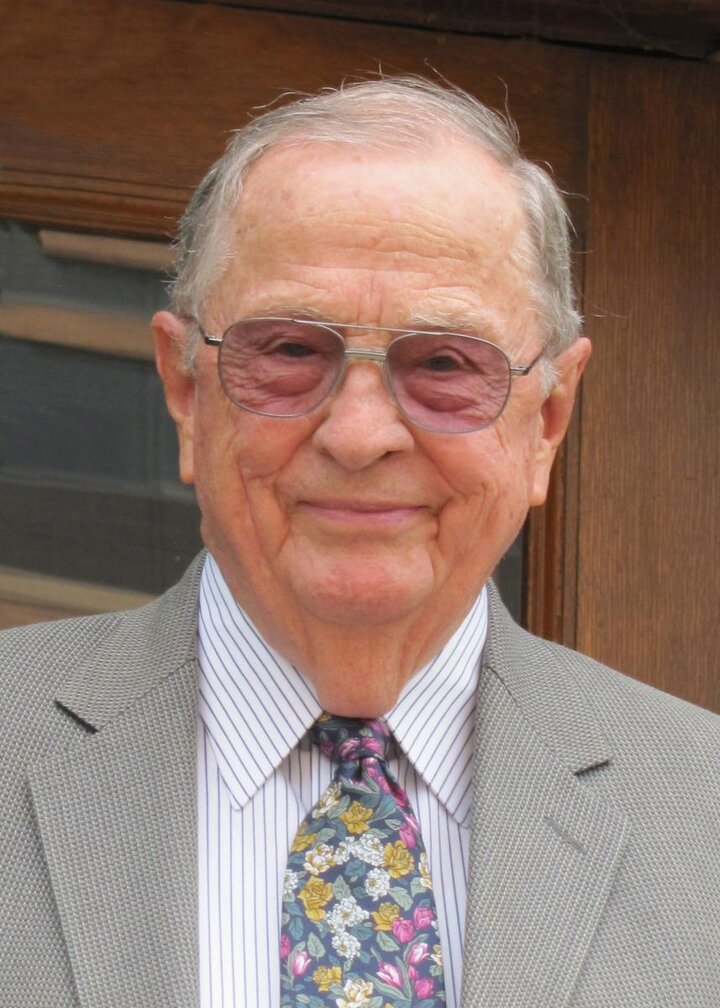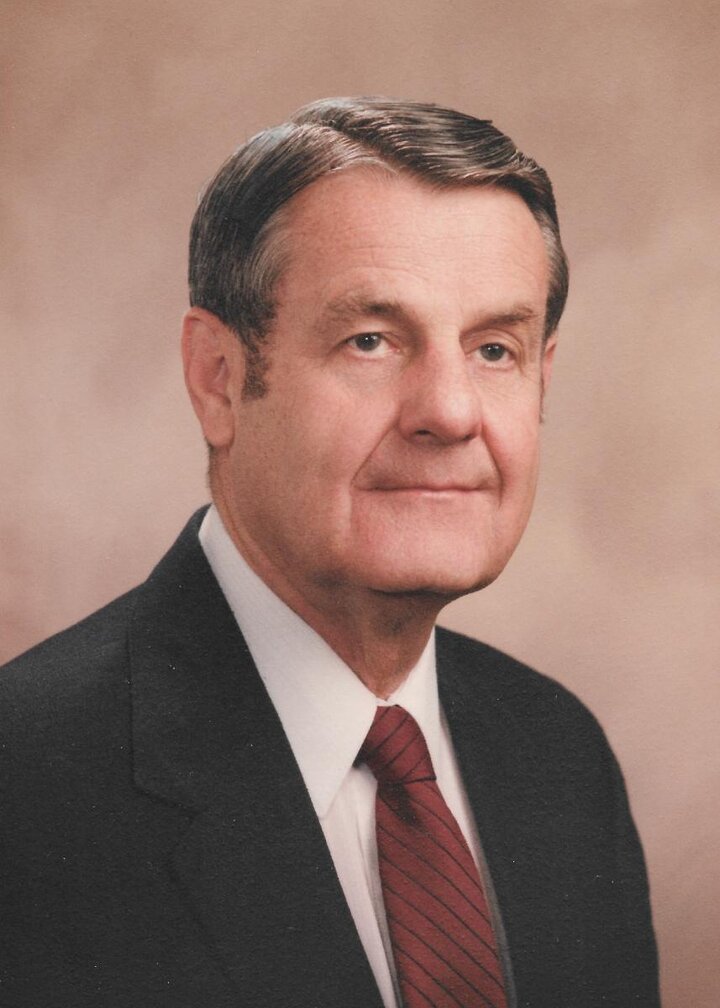Warren “Buck” Gabelman and Wayne F. Keim, University of Nebraska–Lincoln alumni received the Department of Agronomy and Horticulture 2020 Alumni Lifetime Achievement Award
This award is the highest honor bestowed upon graduates of the Department of Agronomy and Horticulture who have made significant contributions to their community, state and nation through professional service, public service and/or civic engagement. The award was founded in 2016 to recognize alumni who have enhanced the reputation of the department and the university by distinguishing themselves in their careers. Honorees are selected by the Agronomy and Horticulture Alumni Advisory Council (AHAAC).

Warren “Buck” Gabelman
April 18, 1921– June 11, 2022
Warren “Buck” Gabelman spent his 42-year career as an educator, research scientist and internationally respected plant breeder in the Department of Horticulture at the University of Wisconsin–Madison.
Gabelman grew up on a farm near Tilden, Nebraska, and graduated in 1942 from the University of Nebraska–Lincoln with a Bachelor of Science degree in plant science. He spent his freshman and sophomore years in the Army Reserve Officer Training Corps, a requirement at Nebraska at that time. He also played varsity baseball for Nebraska for three years.
Gabelman enlisted in Midshipmen’s School at Notre Dame University after the attack on Pearl Harbor. He was assigned to the USS Nicholas and served as a communications assistant, then officer, in the Pacific Ocean Theater during World War II.
After the war, Gabelman returned to Nebraska as a student for one semester. He then joined the staff at the Connecticut Experiment Station in New Haven with the expectation he would work on his doctoral degree in botany and microbiology at Yale University.
In 1949 he completed his Ph.D. and began his career at UW–Madison where he became a noted professor, vegetable breeder and administrator.
An innovator in modern plant breeding, Gabelman founded the College of Agricultural and Life Sciences Department of Horticulture’s hybrid vegetable breeding program. His research involved the development of hybrid germplasm in beets, carrots and onions, and the role of irrigation in the production of snap beans. During his career, he developed and released over 75 vegetable inbreds, hybrids and cultivars. Virtually every consumer of beets, carrots and onions has benefited from his breeding program.
Gabelman served as chairman of the Department of Horticulture from 1965 to 1973. The Plant Breeding and Plant Genetics graduate training program was started in 1968 because of his vision for a science-based program in plant breeding. He served as chairman of this program from 1976 to 1978.
Gabelman’s extensive travels provided him with insights into similar horticultural problems worldwide. He served on a National Academy of Sciences panel that studied issues of genetic diversity for crop plants and provided recommendations for the improvements in germplasm conservation.
He retired from UW–Madison in 1991.
Throughout his career, Gabelman received many awards and honors in recognition of his national and international work as a vegetable breeder and as a prolific teacher.
Nebraska’s College of Agricultural Sciences and Natural Resources Alumni Association honored him with the Henry Beachell Distinguished Alumni Award.
For his achievements in plant breeding research he was awarded honorary doctoral degrees from Nebraska and from the University of Agriculture in Krakow, Poland. Gabelman also received the Genetics and Plant Breeding Award from the National Council of Commercial Plant Breeders and the Award of Honor for Outstanding Achievement in Horticulture from the All American Selections.
Gabelman received the Wisconsin College of Agricultural and Life Sciences Distinguished Service Award. Two Wisconsin Distinguished Graduate Fellowships were created in his honor.
He was an active member of the American Society of Horticulture Science and served as president, associate editor, chairman of the ASHS Building Committee, chairman of the Board of Directors, a member of the Horticultural Council and a delegate to the Federation of Scientific Agricultural Societies. He also served as a representative to the International Society for Horticultural Science Governing Board.
Gabelman was named a Fellow of ASHS and inducted into the ASHS Hall of Fame. He received the ASHS Environmental Quality Research Award and was co-recipient of the ASHS Marion Meadows award for outstanding graduate student research papers for four years. He was also awarded the M.A. Blake Award for Distinguished Graduate Teaching from ASHS.
He was also named a Fellow of the American Association for the Advancement of Science.

Wayne F. Keim
May 14, 1923–February 11, 2020
Wayne F. Keim graduated from the University of Nebraska in 1947 with Bachelor of Science degrees in agronomy and mathematics. A basic genetics course taught by his father, Franklin D. Keim, chairman of Nebraska’s Department of Agronomy from 1932 to 1952 and a 2019 Alumni Lifetime Achievement Award recipient, led him into a long career devoted to inspiring students in genetics and pursuing research in plant breeding and genetics.
After just three semesters at Nebraska, Keim was drafted into the United States Army during World War II in 1943. After three years of military service, he returned to Nebraska to complete his undergraduate degree.
He went on to earn a Master of Science degree in 1949 and a Ph.D. in 1952 in plant breeding and genetics, both from Cornell University.
Keim’s first job after graduating from Cornell was as an assistant professor of botany teaching undergraduate botany classes at Iowa State University in Ames.
In 1956, he took a position at Purdue as an assistant professor of agronomy and genetics in the Department of Agronomy. For 20 years, his primary responsibility was to teach undergraduate courses in genetics and plant breeding. He also worked on plant breeding research in forage legumes.
While working at Purdue, Keim taught summer classes at Colorado State University in Fort Collins and at the University of Hawaii in Honolulu. He also spent a sabbatical year at CSU teaching genetics and another year at the University of Lund in Lund, Sweden, doing research.
In 1975, he left Purdue to become head of the Department of Agronomy at CSU, a position he held until 1985. When he arrived at CSU only three departments existed in the School of Agriculture. He began retooling the department to become an international leader in soil and plant science teaching and research. With his great people skills, he also made it a place where faculty, staff and students became a cohesive team
During his tenure, undergraduate and graduate enrollments and faculty member numbers reached all-time highs. He encouraged faculty to excel in their professions and to become active in professional scientific societies. He also embraced new ways of working and purchased modern copying equipment and the first computers for the department.
Although Keim’s accomplishments are evident in the development of CSU’s agricultural department, he was especially proud of the successes of his students. He was considered a master of education and a champion of students, and motivated many to pursue careers in agriculture and genetics. Over 100 of his students majored in plant breeding and genetics, and nearly all of his 20 graduate students were published.
“The primary responsibility, in my eyes, is educating students,” said Keim, reflecting on his years as a professor.
He retired from CSU in 1992.
Keim made many outstanding contributions at Cornell, Iowa State, Purdue and CSU in his 45 years of teaching, research and administration and received many honors and accolades. His teaching awards were numerous. The American Society Agronomy awarded Keim the Agronomic Education Award. Purdue students recognized him as “Best Teacher” in 1965 and 1968. He received the Purdue’s Harbison-Danforth Teaching Award in 1970 and is listed in Purdue’s initial Book of Great Teachers. He received Legend of Agronomy Awards from Purdue in 2007 and from CSU in 2009.
Keim was elected Fellow in the Crop Science Society of America and served as the society’s president in 1984. He was also elected Fellow in the American Association for the Advancement of Science, the ASA, and the National Association of Colleges and Teachers of Agriculture.